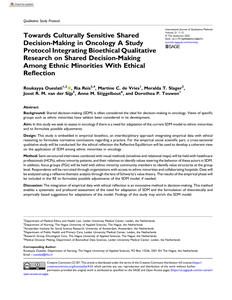Background: Shared decision-making (SDM) is often considered the ideal for decision-making in oncology. Views of specific groups such as ethnic minorities have seldom been considered in its development. Aim: In this study we seek to assess in oncology if there is a need for adaptation of the current SDM model to ethnic minorities and to formulate possible adjustments. Design: This study is embedded in empirical bioethics, an interdisciplinary approach integrating empirical data with ethical reasoning to formulate normative conclusions regarding a practice. For the empirical social scientific part, a cross-sectional qualitative study will be conducted; for the ethical reflection the Reflective Equilibrium will be used to develop a coherent view on the application of SDM among ethnic minorities in oncology. Method: Semi-structured interviews combined with visual methods (timelines and relational maps) will be held with healthcare professionals (HCPs), ethnic minority patients, and their relatives to identify values steering the behavior of these actors in SDM. In addition, focus groups (FGs) will be held with ethnic minority community members to identify value structures at the group level. Respondents will be recruited through organizations with access to ethnic minorities and collaborating hospitals. Data will be analyzed using a reflexive thematic analysis through the lens of Schwartz’s value theory. The results of the empirical phase will be included in the RE to formulate possible adjustments of the SDM model, if needed. Discussion: The integration of empirical data with ethical reflection is an innovative method in decision-making. This method enables a systematic and profound assessment of the need for adaptation of SDM and the formulation of theoretically and empirically based suggestions for adaptations of the model. Findings of this study may enrich the SDM model.
DOCUMENT

This thesis focuses on topics such as preterm birth, variation in gross motor development, factors that influence (premature) infant gross motor development, and parental beliefs and practices. By gaining insight into these topics, this thesis aims to contribute to clinical decision-making of paediatric physiotherapists together with parents, and with that shape early intervention.
DOCUMENT

Door COVID-19 crisis zijn er extra uitdagingen om de verdere doorontwikkeling van het praktijkgerichte onderzoek en de onderliggende infrastructuur en professionalisering kwalitatief en kwantitatief te realiseren. De Hogeschool van Arnhem en Nijmegen (HAN) zet de IMPULS 2020 middelen in om de rol van het praktijkgericht onderzoek hierin te bestendigen en versterken. Het betreft een academie overstijgende aanvraag. Het beschikbare budget vanuit de regeling bedraagt 550.000 euro en zal in 2021 via twee lijnen worden ingezet: 1. Netwerk- en visievorming Dit richt zich op de versterking van de strategische netwerkvorming en samenhang overstijgend aan de zwaartepunten als focus gebieden voor de samenwerking onderwijs, onderzoek en werkveld (deels is hier aandacht voor de ontwikkeling en samenwerking bij regelingen als SPRONG of MMIP). Dit moet leiden tot het ontwikkelen van een meerjarige roadmap SLIM, SCHOON & SOCIAAL (S3). De regie ligt bij dit deel bij het zwaartepunt management. (Sustainable Energy & Environment (SEE), Smart Region en Health). 2. Professionalisering onderzoeksondersteuning Dit gedeelte betreft het vervolg op het project professionalisering onderzoeksondersteuning en richt zich (in lijn met het nationale project DCC) op de doorontwikkeling van: datastewardship, FAIR data & open access, ICT kennisinfrastructuur en communicatie rondom onderzoek en ondersteuning, verdere ontwikkeling van een Open Science Platform en voorbereiding op een HAN Open Access Fonds. Dit deel zal vanuit Services Onderwijs, Onderzoek en Kwaliteitszorg gecoördineerd worden. Middels deze inzet geeft de HAN een extra stimulans aan de strategische samenwerking en de verdere ontwikkeling van een consistente en herkenbare onderzoeksprogrammering en -ondersteuning.